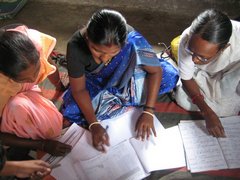
Photographer: Aishawarya Pillai
The Coalition for Sustainable Nutrition Security (The Coalition) convened an online discussion from October 16-18, 2013 to engage experts in a dialogue about the Leadership Agenda for Action¹ (LAA) and the need to amend the agenda to account for recent nutrition evidence.
The online expert discussion was led by The Coalition with support from the Institute of Development Studies (IDS), a POSHAN partner, and was hosted in a private group on the Eldis Communities website². Nearly 75 experts from India took part in the online deliberations, including representatives from government and civil society organizations, along with senior experts in nutrition and public health.
The event was initiated under the leadership of Prof. M.S. Swaminathan, chair of The Coalition, and facilitated by Drs. Sheila Vir and Rasmi Avula.
Over the course of three intensive days of discussion, experts exchanged perspectives in response to the following key questions:
- What revisions are needed, if any, to the existing list of direct interventions for reducing maternal and child undernutrition in the LAA?
- How can we effectively scale up implementation of the direct interventions to improve maternal and child nutrition?
- What pieces of the new and emerging evidence base are most relevant in the Indian context to create an enabling environment that improves maternal and child nutrition?
At the end of each day, the contributions were collated, summarised, and shared with the group.
The level of participation was relatively strong for this type of online forum - 45% of participants actively contributed at least once and nearly 20% contributed several times. Each post was, on average, more than 300 words long, highlighting the substantive nature of the conversation and time invested by participants.
Key discussion points
Many participants felt that the LAA currently addresses the majority of the interventions needed to improve maternal and child nutrition. Participants also suggested that the LAA could be strengthened by incorporating some additional interventions (described below) informed by the latest evidence from the Lancet 2013, Cochrane reviews, state-specific studies, HUNGaMA, and NHFS-3.
Participants suggested that more attention be paid to interventions in Water, Sanitation and Hygiene (WASH), beyond what is currently included in the LAA, which is primarily focused on food hygiene and safe handling. Participants also felt that environmental health should to be prioritized in the LAA recommendations, given the associations between stunting prevalence and adequate food, care, and environmental health.
¹The LAA was developed by The Coalition in 2010.
²community.edlis.org


